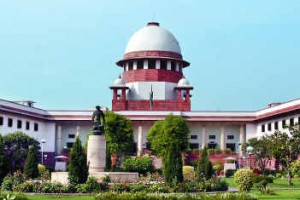Hiding information can lead to elected candidate’s unseating: SC
 NEW DELHI : The Supreme Court has said that any holding back by an elected representative of information on the criminal antecedents and educational qualifications including their assets and liabilities, the spouse and dependent children at the time of filing nomination papers would result in their unseating.
NEW DELHI : The Supreme Court has said that any holding back by an elected representative of information on the criminal antecedents and educational qualifications including their assets and liabilities, the spouse and dependent children at the time of filing nomination papers would result in their unseating.
“Once it is found that it was a case of improper acceptance, as there was misinformation or suppression of material information, one can state that question of rejection in such a case was only deferred to a later date,” said a bench of Justice Surinder Singh Nijjar (since retired) and Justice A.K.Sikri in their recent judgment.
The court said that at the time of filing the nomination paper, if a candidate leaves blank any column seeking information on criminal antecedents, educational qualifications and assets and liabilities, then it would result in rejection by the returning officer at the scrutiny stage itself.
But if there is suppression of information or misinformation then it would be decided by a detailed inquiry in an election petition by the court.Holding that when there is a suppression of information or filing of an incorrect information, Justice Sikri, speaking for the bench, said that it may not be possible for the returning officer to hold a “detailed examination” of the same at the time of scrutinising the nomination papers and “summary enquiry may not suffice”.
“When the information is given by a candidate in the affidavit filed along with the nomination paper and objections are raised thereto questioning the correctness of the information or alleging that there is non-disclosure of certain important information, it may not be possible for the returning officer at that time to conduct a detailed examination,” the court said.
In such a situation, a “summary enquiry (by the Returning officer) may not suffice”, it said.Upon a detailed inquiry, “once it is found that it was a case of improper acceptance, as there was misinformation or suppression of material information, one can state that question of rejection (of nomination papers) in such a case was only deferred to a later date”.Referring to its earlier judgments and guidelines issued to the Election Commission, the court said that “citizens have fundamental right under article 19(1)(a) of the constitution of India to know about the candidates contesting the elections and this is the primary reason that casts a solemn obligation on these candidates to furnish information” on three counts.
The court verdict came while dismissing an appeal by Kisan Shankar Kathore who was elected to Maharashtra assembly in the October 2004 elections from Ambernath constituency in Thane District.His election was challenged in a petition by Arjun Dattatray Sawant – a voter in the constituency and others – and it was set aside by the Bombay High Court by its 16 August, 2007 judgment.The high court set aside the election of Kathore on the grounds of non-disclosure of two outstanding electricity bills amounting to Rs.79,200 and Rs.66,250, about a bungalow owned by his wife and tax dues of Rs.3,445 as well a vehicle and of property owned by firm Padmavati Developers of which Kathore is a partner.
The apex court while holding that non-disclosure of outstanding electricity dues was not a serious lapse, the non-disclosure of wife owning a flat and vehicle and his interest/share in the partnership firm was a major and serious lapse.
“We, therefore, are of the view that in the affidavits given by the appellant along with the nomination form, material information about the assets was not disclosed and therefore, it is not possible to accept the argument of the appellant that information contained in the affidavits be treated as sufficient/substantial compliance,” the court said as it dismissed Kathore’s appeal.

